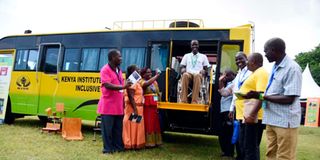Holidays for All: Lack of accessibility in tourism blue ocean for the sector

Participants at the Kenya Primary Schools Head Teachers Association (Kepsha) Annual Delegates Conference in Mombasa in December 2017 admire a disability-friendly bus.
What you need to know:
- Picture a PWD planning or endeavouring to travel to a tourist destination of their choice.
- If they don’t own a car or can’t afford a taxi, they have to use public transport, which is hugely exclusive.
Augustine of Hippo said: “The world is a book, and those who do not travel read only one page.”
Travelling provides one with many opportunities to experience the world, make memories and learn. But persons with disabilities (PWDs) are hindered by a myriad factors, making them wanderers in a world of limits.
For 14 years, I’ve lived through this experience. Picture a PWD planning or endeavouring to travel to a tourist destination of their choice. If they don’t own a car or can’t afford a taxi, they have to use public transport, which is hugely exclusive. A 2018 Deloitte City Mobility Index revealed that only three per cent of matatu operators in Nairobi have policies that cater for PWD needs — like accommodation for wheelchairs and crutches.
Are the seats adequate for the disabled person to sit on? If the person is blind, and the driver changes route due to traffic issues, how do we inform him/her of this in the absence of a guide? At the hotel, are there accessibility tools? Hopefully, there’s a ramp, but are the rooms on the top floors accessible? Do the front desks have counters that are not too high for check-in? Are there accessible terrains into the beautiful, serene park or beach? Or will one be confined to his/her room and the cafeteria on the ground floor?
Such a description serves to show one thing: The spontaneity of travel is quite an alien concept for most PWDs. The mismatch clearly marks out the wall between these two worlds and presents a rallying call for promotion of accessibility in Kenya’s tourism sector.
Accessible walkways
With the neglect and isolation, as far as holidays are concerned, disability features in the messaging around preventing road crashes!
Accessible tourism will benefit tourists with disabilities. The WHO estimates that six million Kenyans have disabilities, a potential blue ocean for domestic tourism. In the international scene, especially Europe — Kenya’s largest source of foreign hotel bed-night occupancies — 70 per cent of PWDs are financially able to go on holiday, shows a study in the international Journal of Tourism Futures.
Tapping into these markets has a huge ripple effect as PWDs mostly travel with their friends, relatives or personal guides. They are also loyal clients, most likely to return where they get a disability-friendly environment.
For instance, creation of accessible walkways by Nairobi Metropolitan Services plays a major role in making the capital city a preferred destination for disabled foreign tourists.
In 2019, the year before the Covid-19 disruption, the tourism sector’s earnings, shows the “Economic Survey 2020”, were Sh163.56 billion. The World Travel and Tourism Council estimated that travel and tourism contributed to the economy eight per cent of GDP and employed about 1.6 million people. As industries rethink their business models, how would it be with accessible tourism?
Disability-friendly
The neglect of disability issues is not necessarily unique to tourism. It’s a result of society’s attitudes and perceptions on matters disability, which are, to a great extent, unintended but with huge exclusion consequences.
Arguably, a hotelier’s choice of having their facility not disability-friendly is not necessarily informed by a deep-seated hatred for PWDs but the general observation that he/she never receives such clients or the cost of investing in the requisite infrastructural adjustments amid competing priorities.
But there is progress. The Ministry of Tourism and Wildlife opened the Nairobi Safari Walk and Animal Orphanage to PWDs to visit at zero costs for a month during the Nairobi National Park’s 75th anniversary last year. The Persons with Disabilities Act 2003 also grants PWDs free access to recreational facilities operated or owned by the government.
Some hoteliers and tour operators have made their hotels and vehicles disability-friendly and safaris accessible for PWDs. Let tourism stakeholders document these best practices for information sharing and more tourist destinations encouraged and incentivised to embrace the principle of universal design across their infrastructural plans to promote equity in access to facilities.
While holidaying next time, look around you and imagine the world as it should be: A world with Holidays for All.
Mr Hassan, the chief executive officer of the National Council for Persons with Disabilities (NCPWD), is the author of 'Behind the Wheels'. [email protected]





